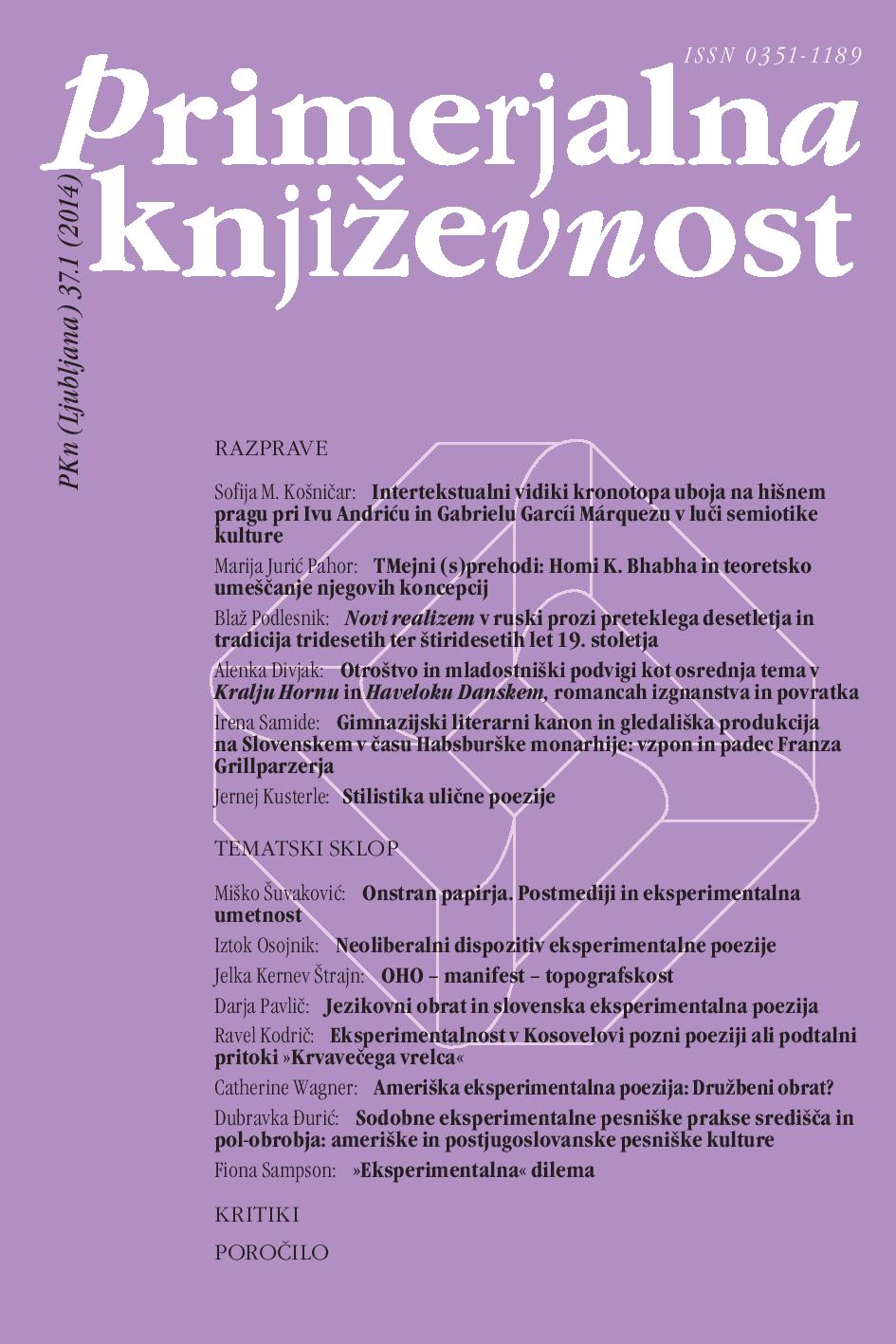OHO – Manifesto – Topography
Keywords:
avant-garde, modernism, neo-avant-garde, experimental poetry, Slovenian avant-garde poetry, OHO groupAbstract
This article reflects on the specifics of the neo-avant-garde and experimental poetry in general, and especially on Slovenian experimental poetry from the 1960s. It is about the literary artistic movement known as OHO, which is discussed in the article through the specific case of Geister’s poetic manifesto Word and Image (Beseda in slika). It discusses the linguistic, spatial, social, and counter-anthropocentric turn within this poetry. The article shows how this poetry differs from tradition; that is, from the poetry of high modernism and the historical avant-gardes, although it shares many common features only with them. – The starting point of the discussion is the belief that the term “modernism” is an umbrella label for a number of literary approaches and trends that differ considerably, and that historical avant-gardes can undoubtedly be catalogued under this aegis. Nevertheless, the article recommends consistent distinctions between “high modernism”, historical avant-gardes, neo-avant-gardes, and experimental poetry. From the theoretical point of view, it refers to the work of Marjorie Perloff, an American literary critic and theorist of Austrian origin that developed a thesis on the two traditions: Eliot’s (modernism) and Pound’s (avant-garde) in contemporary Anglo-American poetry. From the historical point of view, the article builds on the work of Michel Foucault and his The Order of Things (Les mots et les choses). Hence, it can properly illuminate the complexity of relationships that are woven between words, images, and objects into art in general and poetry in particular. The thesis on the specificity of experimental poetry is derived on the one hand from the reading of Derrida’s notion of writing, as developed by the philosopher in his book Writing and Difference (Écriture et différence)—especially in the chapter “Freud and the Scene of Writing,” where the phenomenon of writing is observed and thematized through Freud’s work The Interpretation of Dreams (Traumdeutung). On the other hand, the thesis is developed further by taking into account the comprehension of the phenomenon of avant-gardes by German literary historian and theorist Peter Bürger and by French philosopher Alain Badiou.References
Badiou, Alain. Dvajseto stoletje. Prev. Ana Žerjav. Ljubljana: Društvo za teoretsko psihoanalizo, 2005. (zbirka Analecta).
Barthes, Roland. Le dégré zéro de l’écriture. Pariz: Éditions du Seuil, 1973.
Breton, André. Arcane 17. Pariz: Fayrd, 1989.
Bürger, Peter. Theorie der Avantgarde. Frankfurt ob Majni: Suhrkamp Verlag, 1974.
Denegri, Ješa. »Razlog za drugu liniju.« Jugoslovenska dokumenta, 89. Sarajevo: Olimpijski centar »Skenderija«, 1989. 1–2.
Derrida, Jacques. »Freud in scena pisave.« Prev. Uroš Grilc. Problemi 33. 7–8 (1995): 49–87.
− − −. Writing and Difference. Prev. Alan Bass. Chicago: University of Chicago Press, 1978.
Dolar, Mladen. »Kaj drži skupaj besede in reči?« Besede in reči. Ljubljana: Studia humanitatis, 2010. 469–492.
Foucault, Michel. Besede in reči: Arheologija humanističih znanosti. Prev. Samo Tomšič in Ana Žerjav. Ljubljana: Studia humanitatis, 2010.
− − −. To ni pipa. Prev. Uroš Grilc in Ana Žerjav. Ljubljana: Društvo za teoretsko psihoanalizo, 2007. (zbirka Analecta).
Geister, Iztok. »Beseda in slika.« Zbornik PERICAREŽERACIREP. Maribor: Obzorja, 1969. (Znamenja 6).
Hajdini, Simon. »Znova nič novega: Adorno, Deleuze, Beckett.« Filozofski vestnik 34.3 (2013): 179–195.
Höller, Christian. »Šestdeseta, sladko in kislo: Pogovor z Markom Pogačnikom in Petrom Weiblom o začetkih njune umetniške poti.« Umetnost življenja – Življenje umetnosti. (The Art of Life – The Life of Art). Ur. Igor Španjol. Ljubljana: Moderna galerija, 2012.
Kernev-Štrajn, Jelka. »Eksistencialna razsežnost modernistične poezije.« Literatura 26.271–272 (2014): 104–114.
Kos, Janko. »Modernizem in avantgarda«. Sodobnost 28.2 (1980): 120–129.
Miller, Jacques-Alain. »Pet predavanj o Lacanu v Caracasu.« Gospostvo, vzgoja, analiza. Ur. Slavoj Žižek. Prev. Eva Bahovec et. al. Ljubljana: DDU Univerzum, 1983. (zbirka Analecta).
Pascal, Blaise. Misli. Prev. Janez Zupet. Celje: Mohorjeva družba, 1986.
Perloff, Marjorie. Radical Artefice: Writing Poetry in the Age of Media. Chicago in London: The University of Chicago Press, 1991.
− − −. The Dance of the Intellect: Studies in the Poetry of the Pound Tradition. Evanston: Northwestern University Press, 1985.
− − −. The Poetics of Indeterminacy: Rimbaud to Cage. Evanston: Northwestern University Press, 1981.
Poniž, Denis. Konkretna poezija. Ljubljana: DZS, 1984. (Literarni leksikon 23).
Pound, Ezra. A Memoir of Gaudier-Brzeska. New York: New Directions Publishing Company, 1970.
− − −. Selected Cantos of Ezra Pound. London: Faber and Faber, 1967.
− − −. The ABC of Reading. New York: James Laughlin, 1987.
Richard, Jean-Paul. Poésie et profondeur. Pariz: Éditions du Seuil, 1976.
Škulj, Jola. »Modernizem in modernost.« Primerjalna književnost 18.2 (1995): 17–30.
− − −. »Modernizem in njegove poteze v lirski, narativni in dramski formi.« Primerjalna književnost 21.2 (1998): 45–74.
Šuvaković, Miško. Anatomija angelov. Ljubljana: Znanstveno in publicistično središče, 2001. (Sophia 2).
− − −. »Nevidne in vidne konstrukcije subjekta. Marko Pogčanik (od OHO-ja do Šempasa).« Umetnost življenja – Življenje umetnosti. (The Art of Life – The Life of Art). Ur. Igor Španjol. Ljubljana: Moderna galerija, 2012. 140–160.
Voelker, Jan. »Obrniti in afirmirati avantgarde: nova paradigma politike.« Prev. Rok Benčin. Filozofski vestnik 34.3 (2013): 163–178.


